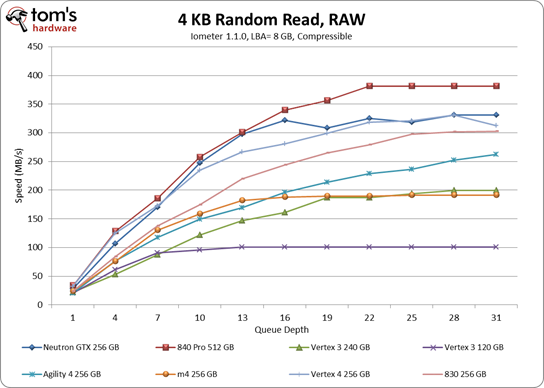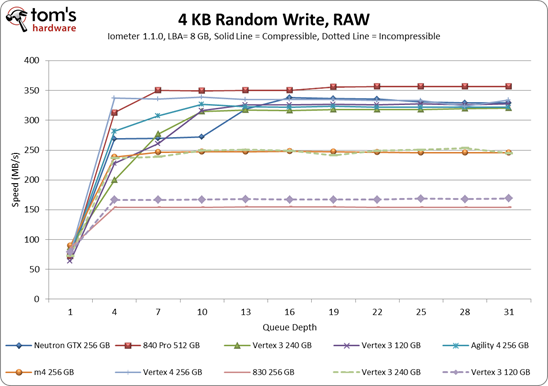Samsung 840 Pro SSD: More Speed, Less Power, And Toggle-Mode 2.0
Benchmark Results: 4 KB Random Performance
We've tested a ton of SandForce-based SSDs, and we know that drives utilizing the same NAND interface perform similarly, regardless of brand. As a result, we're representing SandForce's second-gen controller by publishing results from OCZ's Vertex 3, which is analogous to Intel's SSD 520 and Corsair's Force GT. All three drives employ synchronous memory.
We're also preconditioning each SSD prior to random and sequential read testing. This helps us address a potential issue whereby a drive's flash translation layer could return a read request without actually accessing data after a secure erase. This should help put our SSDs on a more level playing field.
Random Read Performance (background info)
Examples include antivirus scans and typing in Word
At a queue depth of one, nearly every SSD delivers ~20 MB/s in random reads. However, as we scale up to four outstanding I/O requests, we start to see the results spread out a bit. The 840 Pro continues to distinguish itself at a queue depth of 16, though, and starts to approach 400 MB/s (or nearly double the speed of Crucial's 256 GB m4 and OCZ's 240 GB Vertex 3).
Just as important, the 840 Pro delivers a nearly-30% performance increase over the 830. We couldn't get Samsung to get specific about a lot of what's going on under the hood, but the company certainly does appear justified in designating a new high-end SSD based on the changes it made.
Random Write Performance
Get Tom's Hardware's best news and in-depth reviews, straight to your inbox.
Examples include email, file compression, and Web browsing
The lines are bunched closer together and intersect more often in our random write test. Every SSD delivers between 60-70 MB/s at a queue depth of one. At a queue depth of four, the field spreads out, but then mixes up a bit during the increase to seven outstanding commands. By then, Samsung's 840 Pro takes the lead, delivering ~350 MB/s (~90 000 IOPS). It remains there all the way through the rest of the test.
In the past, we've seen Samsung's drives perform poorly in random write tests. It was an issue for the 470, and we saw it again from the 830, which hangs toward the bottom of this chart. The fact that the 840 Pro rectifies this means the biggest weakness from previous generations is being addresses effectively.
Current page: Benchmark Results: 4 KB Random Performance
Prev Page Test Setup And Benchmarks Next Page Benchmark Results: 128 KB Sequential Performance-
mayankleoboy1 Kudos to Samsung for getting ahead of the competition yet again. And the complete SSD is designed and manufactured in house! And thay are sure of its reliability, hence the 5 year warranty.Reply
I dont see why it did not get a Toms approved award.... its faster, uses less power, and offers better warranty than the competition. And the firmware is also stable, unlike SF. -
mayankleoboy1 Despite what the judges believe, Samsung is a great innovator. Unlike some fruity companies, that basically license other companies tech....Reply
-
willyroc Wow, Samsung was ahead of competitors with its 830 due to superior performance and low prices. Now I bet the 840 has, (or will) widened that lead.Reply -
pocketdrummer mayankleoboy1Kudos to Samsung for getting ahead of the competition yet again. And the complete SSD is designed and manufactured in house! And thay are sure of its reliability, hence the 5 year warranty. I dont see why it did not get a Toms approved award.... its faster, uses less power, and offers better warranty than the competition. And the firmware is also stable, unlike SF.Reply
Probably because it still costs $600 for a pathetic 512gb of memory. Once you can get 512gb for under $200 and have a life span that gets close to a decent HDD, then you can expect an award.
They keep increasing the speed, but they do nothing to reduce the COST. I would take an SSD half as fast as some that are out now if they cost me half as much and had a decent amount of storage. It's still pointless for someone like me who has over 1.5TB of space used. I can't load Windows and all of my critical programs on a 256GB SSD, and the 512GB wouldn't give me much wiggle room. Not to mention my sample libraries that would benefit from the speed... that are hundreds of GB each. -
So it's the Samsung 840Pro 256GB for C:, and it's the Seagate single-platter 1TB drive (ST1000DM003) for storage. Awesome awesome combo.Reply
-
sherlockwing Gah, 1 month after I get the 830 now comes the 840 Pro who gets another 120 mb/s in extra speed.Reply -
mayankleoboy1 sherlockwingGah, 1 month after I get the 830 now comes the 840 Pro who gets another 120 mb/s in extra speed.Reply
Thats technology growth for you :D -
sherlockwing To those that complain about SSD life span, the truth is that in 3 years(typical warranty of an SSD) you won't be using the same SSD because the new SSD will be 40-50% faster. 3 year from now I'd be using the 860 Pro with anyway and when an SSD reach end life it just can't write anymore, you can still read all the files onto your new SSD unlike a hard drive that just breaks down.Reply

